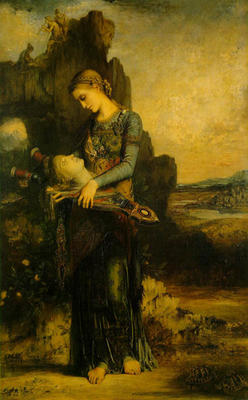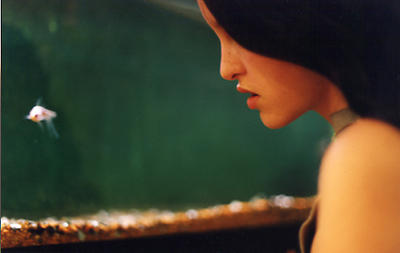An Orphic Scatter

The music of Orpheus can still be heard today, high and distant, like the sound of a woman's voice inside an ebbing wave or harp-strings feathering the softest billows of a breeze. But we have to hearken far back into our past, into the mythic background, to source those Orphic remnants. He is an interface for mystery and history.
Son of the Thracian King Oeagrus and the Muse Calliope, Orpheus was presented a lyre by Apollo and instructed in how to play it by the Muses, so well that his song enchanted all of nature, not only wild beasts but trees and even stones. A song which "built a temple inside our hearing," as Rilke puts it.
His song was so good that he is made an argonaut by Jason and voyages in search of the Golden Fleece, his music charming gulls and fishes, a sort of aural sextant for the quest.
That music was put to its greatest test when his wife Eurydice was stolen from him on his wedding day; she is bitten in the heel by a serpent and dies. Orpheus cannot let his wife go and travels down to Tartarus, singing his way past the monstrous dog Cerberus, causing the Judges of the Dead to break into tears, moving even the heart of Persephone at the darkest mordor of Hell. It is she who convinces implacable Hades to let Eurydice go. The condition is simple: Orpheus must not look back on the face of his beloved until they have cleared the last ridge of the dead and they are fully in the sun again. The sound of his lyre alone is what guides Euryidice in that darkness. But Orpheus is not divine, and his eagerness to look upon the face of Euyrdice (whose name is associated with the moon, the true source of all creativity), and just before they have cleared the night, he looks back and like a dream which dissolves into a pillow at waking she fades, lost forever to him.
Grief for Orpheus is bitter and transforms him in an ugly way. He renounces heterosexual love and becomes a devotee of solar Apollo, vaunting instead love of young boys. (Catholic priests suffer from an Orphic cultural souring.) His denouncement of Dionysos puts him in the crosshairs of the Maenads, who catch up with him one day and begin to pelt him with stones. At first his song charms the projectiles, causing them to swoon and fall; but then one stone grazes his head and his song begins to falter. The stones start regularly hitting their mark. Soon the Maenads are on him, tearing him apart with the supernatural animal strength their master bestows them.
But the song does not die. The Muses collect his limbs and bury them at Liebethra at the foot of Mount Olympus, where they become singing nightingales. The head of Orpheus was thrown by the Maenads into the river Hebrus where it floated, still singing, all the way to the sea. Eventually it washed up on the isle of Lesbos, sacred to Apollo's mother Selene (another moon-figure). The lyre, still playing, washes too up at Lesbos. The head of Orpheus sings and prophesies so loudly that it angers his patron Apollo, who doesn't appreciate the competition. To his former priest he says, "Cease from interference in my buisness; I have borne long enough with you and your singing." And the head falls silent at last.
Orpheus is reputed to be a mystic founder as well, instituting the Mysteries of Apollo in Thrace, those of Hecate in Aegina, and of Demeter in Sparta.

A complex story; it has the sort of mythic mash of agonies and ecstasies we found in unravelling the Demeter mythologem. Here is the first singer, a great lover, the aggrieved solarist, the tragic scattered hero whose song lives on. It is a parabola of transformations which ferries a music to the many shores of a life. Always that song in the bow, pointing (or leading) the way: questing for a Fleece, charming love back from death, becoming love's apostate and rebel; singing on beyond personal death.
It's interesting to me that the courses Orpheus takes are all heroic and ego-driven, a sort of willful contest against the gods and divine law, powered and enobled by a gift which is wholly divine -- not really belonging to Orpheus at all. The song endures despite his foolish and all-too-human gambits. He may help Jason find the fleece but he cannot prevent Jason's hubris and fate; he may woo a maid with it but it does not guarantee a marriage; he may try to woo back Eurydice from death but he cannot best his own eagerness to see her again; he cannot endure defeat and thus becomes love's opposite, scorning Aphrodite and embracing Eurydice's (the moon-goddess) opposite, solar, ever-youthful, eternal Apollo; he preaches against Dionysos and ends up a bloody mess for it.
All the while that blessed music is there, leaking from his lyre, leading him on, teaching him many things but not granting him the sort of wisdom that would make him content just to be. He may be a priest of the Mysteries but such knowledge only causes him to suffer. His gift is his curse, awesome and awful. It is a knowledge lost on human ears, beguiling and aloof. Ariel's music is both sweet and cold, nearby and infinitely far; it leads men to doom and entrances lovers and haunts the dreams of old men.
The music of Orpheus is that sense of life's intimate mysteriousness, the presence of the eternal in the local, haunting because its is both so close and so far, maddening like a gold fruit hanging from a silver branch just out of reach. That music is in my ache for a beloved I can never find though I swear she is near by, perhaps on the next shore, in my wife but not, fading ever as I think I finally see here.
That music is in all questing for bliss, ever leading us argonauts of mystery on to the next source, the next story, the next excavation, the next exegesis, raising nipples and hardness from old dead things, enlivening the sources, making abysms shimmer blue, goading the hooves in my hand to write faster, get it down, get across a void of white paper toward that fleece which my gut tells me is just over the next page, down beyond the last line I write.

It is a bittersweet sound, gorgeous and tragic, infinitely tender and achingly sad, enthralling and bewitching; like a siren's song, it is impossible to resist and perilous to engage. One should never compass via siren but we're all fools to that music, running off in every direction to slake our ears on it, leaving wives and careers for a bit of its mad blue moon jazz, drinking it to dregs which have no bottom, no sufficient slake.
Or, older, wizened, wiser if only for the damage suffered to the equipage and the life, we find a way to stopper our ears to that music, only to discover it ringing still there, like the sound of the sea in a beached conch. The music which sounded like it was out there is really inside, a commotion of muses which weave mystery and history and delight and woe into a sodden and airy harmony, all heavenly spheres revolving in the song of the heart, all mighty gods circulating in fragile chambers of mortal tissue and ever-spilled blood.
Confusing the harmonies is all too-human; it's our mortal bone and bane. We hear it everywhere, usually in the most surprising places. We can't get away from it -- indeed, to wall ourselves off from it is to invoke its darker retributions -- and there's no way to fully swim its billows. Damned if you do, damned if you don't; can't live with it or without it -- these are classic hallmarks of the presence of the Orphic scatter.
The story(ies) of Orpheus have grown more human over our history, in reverse direction to most myths where a human king becomes divine over time. Orpheus is conjectured to have been a shamanic figure of sorts going back to the second millennium BC, able to transcend mortal boundaries with his song. He becomes a semi-magical poet in Ovid and Virgil with a human failing which renders unsuccessfuil his quest to rescue Eurydice. By the Middle Ages, Orfeo must rely upon his chivalric background to assist him in his dealings with the Fairy King; it is contemporary social practices which ensure his beloved's return. The song has never departed from our history, but we have distanced from it, understanding that though we hear and sing it, we are not made of such immortal stuff.
Yet it seems, finally, that for all of the mortal confusion and misery that surrounds the sweet song of Orpheus, like thorns around a rose, the essence of that music transforms back to the mythic. Our hearts are thus wombs, fertilized by that music through the porches of our outer and inner ears, where our fates are engendered. The next day we light upon a figure standing by distant waters, and something leaps forth from us in that direction, taking us on our next quest, the next strange installment in our history. The song of Orpheus is the magic of our own natures, whistling along as we move on down the road, circling through a life (or lives) all the way back home to first dreams, mythic sources, scattered though they forever be, like diadems of moonlight on a midnight tide.

THE CONTAINER FOR THE
THING CONTAINED
Jack Gilbert
What is the man searching for inside her blouse?
He has been with her body for seven years
and still is surprised by the arches of her
slender feet. He still traces her spine
with careful attention, feeling for the bones
of her pelvic girdle when he arrives there.
Her flesh is bright in sunlight and then not
as he leans forward and back. Picasso in his later
prints shows himself as a grotesque painter
watching closely a young Spanish woman on the bed
with her legs open and the old duenna in black
to the side. He had known nakedness every day
for sixty years. What could there be in it still
to find? But he was happy even then to get
close to the distant, distant intermittency.
Like a piano playing faintly on a second floor
in a back room. The music seems familiar, but is not.


<< Home